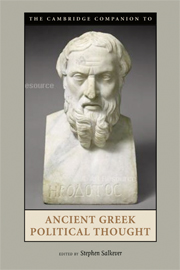Book contents
- Frontmatter
- Introduction
- 1 Homer and Political Thought
- 2 Foundings vs. Constitutions: Ancient Tragedy and the Origins of Political Community
- 3 Most Favored Status in Herodotus and Thucydides: Recasting the Athenian Tyrannicides through Solon and Pericles
- 4 Thucydides and Political Thought
- 5 “This Way of Life, This Contest”: Rethinking Socratic Citizenship
- 6 The Political Drama of Plato’s Republic
- 7 Practical Plato
- 8 Reading Aristotle’s Nicomachean Ethics and Politics as a Single Course of Lectures: Rhetoric, Politics, and Philosophy
- 9 Lived Excellence in Aristotle’s Constitution of Athens: Why the Encomium of Theramenes Matters
- 10 The Virtue Politics of Democratic Athens
- 11 Origins of Rights in Ancient Political Thought
- 12 The Emergence of Natural Law and the Cosmopolis
- Select Bibliography
- Index
1 - Homer and Political Thought
Published online by Cambridge University Press: 28 September 2009
- Frontmatter
- Introduction
- 1 Homer and Political Thought
- 2 Foundings vs. Constitutions: Ancient Tragedy and the Origins of Political Community
- 3 Most Favored Status in Herodotus and Thucydides: Recasting the Athenian Tyrannicides through Solon and Pericles
- 4 Thucydides and Political Thought
- 5 “This Way of Life, This Contest”: Rethinking Socratic Citizenship
- 6 The Political Drama of Plato’s Republic
- 7 Practical Plato
- 8 Reading Aristotle’s Nicomachean Ethics and Politics as a Single Course of Lectures: Rhetoric, Politics, and Philosophy
- 9 Lived Excellence in Aristotle’s Constitution of Athens: Why the Encomium of Theramenes Matters
- 10 The Virtue Politics of Democratic Athens
- 11 Origins of Rights in Ancient Political Thought
- 12 The Emergence of Natural Law and the Cosmopolis
- Select Bibliography
- Index
Summary
Plato did Homer no favors. When Plato banished Homer from his republic, he posited a split between epic and philosophic knowledge that would remain a part of a Western philosophical tradition. For Plato, the problem with the Homeric epics was that they were imitations of phenomenal appearance because they depicted the shadowy world of human action and emotion. Though tempered in recent years by examinations of both the philosophic contributions of literature and the literary basis of philosophy, what has often emerged is a distinction, made both implicitly and explicitly, between political thought - which is depicted as a systematic, reasoned, reflective, and critical account of the political world - and the epics - which are often characterized as uncritical appropriations of myths, legends, stories, and superstitions. As evidence, commentators point to a seemingly irrational cosmology alive with divine forces, inconsistencies in the stories that comprise the epic, and the oral nature of epic verse in which the aim was to tell a particular story and not to analyze the foundations of thought.
In this chapter, I approach Homer as a political thinker. By this I mean both that the epics are engaged in critical reflection and that this reflection is political in nature. The chapter will proceed in several parts. First, I will examine two major obstacles to approaching the epics as works of political thought: the ideas that oral poetry lacks a critical dimension and that Homeric society is pre-political. I end these sections by making an argument about what is critical and what is political in the epics. In the subsequent sections, I engage in a series of forays into Homeric political thought, taking up contending notions of power, rights, the people, gender, and ethics.
- Type
- Chapter
- Information
- Publisher: Cambridge University PressPrint publication year: 2009
- 1
- Cited by

